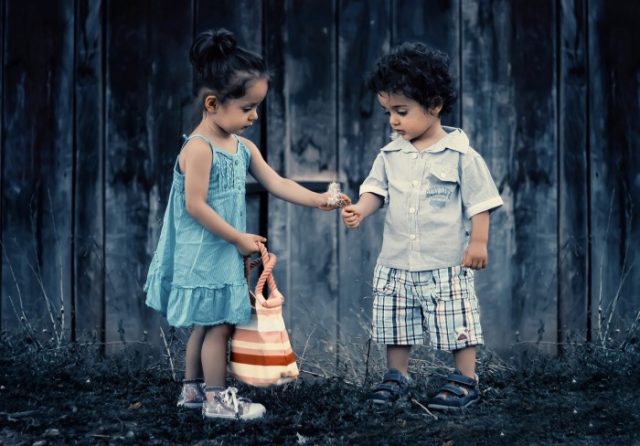One of the biggest challenges of parenting is remaining calm when a child has pressed all of your buttons. When the whining seems like too much to endure, when I feel my exhaustion running high and patience running thin, and when I feel that the child is not listening or caring, I remind myself to “just be kind,” and it sets me right every time.
Nobody is immune to having their buttons pressed, and sometimes, children will intentionally push your buttons so that they can learn how you will react. Typically, the child is not pushing you intentionally, and they are having a hard time controlling themselves. Even if they are trying to provoke you intentionally, they are doing it to learn, not to hurt you. Losing your cool with a child makes them curious to see how intense you will get and teaches them that losing their cool is acceptable.
When it comes to parenting, the golden-rule is a great start. Nobody likes being belittled, berated, lied to, living in fear, or feeling inadequate. If you treat your child with the same respect that you treat an adult, and treat them how you would want to be treated, you are off to a great start, but the adult needs to remember to think about how they would want to be treated at the child’s age, not as an adult.
Children need more understanding than a fully developed adult. I find it acceptable for an adult who is acting like a jerk to be treated like one, but different rules apply when dealing with children. An adult doesn’t need someone to help them manage their emotions and their daily tasks. When you are interacting with a child, you are literally the bigger person, and you must act like it.
To act like the bigger person when the crankiness wont cease, and when I feel like I just don’t even know what to do anymore, I remind myself to be kind. Being kind puts me in a zone where I can remain present, calm, and patient. Being kind makes me think of things that I otherwise would not think to do or say, and it brings out the empathy that the child is looking for and needs to learn.
Sometimes, children get stuck in an emotion, and they need a strong presence of kindness to lift them up. Children do not realize that every moment is a new moment, and to them, the world might just feel like it is ending. Being kind will help both adult and child and ensure that the adult does not end up acting in a manner that will make them feel guilty or the child feel scared.
For me, being kind has worked every time. An outsider may view this tactic as “giving in, spoiling, or failing to discipline,” but that is not the case. Being kind is being there and helping a little one through their mood so that they can calm down. Discipline is teaching, and nobody can learn when emotions are running high; someone has to calm the situation down before any lesson can be taught, and it has to be the adult.
First, I remind myself “be kind.” Then, I take a few deep breaths and remind myself that I am interacting with a child, not an adult. I remind myself that children need constant modeling and repetition to learn.
An example of being kind is acknowledging that a child has fallen or gotten hurt instead of acting like they are whiny for mentioning it. In working with children, I have noticed the children who get nurtured during their early boo boos are the ones who cry less about them as they grow older. It seems the ones who have always been told “you’re fine, get up!” are more likely to whine about the slightest fall or bump well into their toddler years.
Another example is picking a crying child up (or sitting near them if they don’t want held) instead of yelling at them to get up and quit crying. If the child asks you to go away, go away, but stay close as they are likely to ask you to come back. If a friend was crying, wouldn’t you try to console them? Just because it might be the millionth time that the child has cried, doesn’t mean that they don’t feel like it is the first and that they don’t need you.
Another example is setting a plate of food in front of them instead of asking “are you hungry?” and demanding an answer when you know that they are acting out because they need to eat. Once they start eating and are calm, talk to them about how they were acting and feeling. Teach them what it feels like to be hungry and to need to eat instead of forcing them to calm down before feeding them. If a child is over-hungry, they may not be able to calm themselves down without food, and keeping them hungry will only make the behavior last longer.
Being kind is teaching and engaging. It is more than just tolerating. It is mustering up the strength to get into a child’s life with love in your heart and to try to make things right for them.
Being kind to a child is not like taking care of an angry customer at work. Being kind to children is a teaching and bonding opportunity. You teach them how to be kind to others, and you can teach them about the situation once they have calmed down.
Being kind doesn’t mean that you can’t have feelings, too. Kindness is being honest. If a child is doing something that you have a hard time dealing with, explain that to them. For example, I explained what nagging means to my child, and I said that I do not like to feel like I am nagging. I explained that I feel like I am nagging when my words are ignored and I have to repeat them over and over, and my feelings have been respected.
I want to raise a child that knows better than to be manipulated and isn’t manipulative. Some may think that being kind raises a manipulator. Manipulators are only kind in order to get their way; I am hoping to raise a child who is authentically kind.







